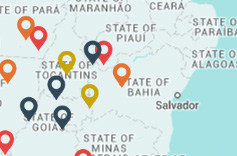Articulation of the Indigenous Peoples of the South – ‘Arpin-Sul’
Delivering legal knowledge for the realization of ethnic and collective rights of indigenous people
Paraná
Arpin-Sul emerged with the purpose of articulating the indigenous peoples of Kaingang, Guarani, Xocleng and Xetá in order to strengthen their autonomy in the states of the South (Paraná, Santa Catarina and Rio Grande do Sul) and to establish financial cooperation, political and legal partnerships, fighting for indigenous peoples’ rights. Some data gathered by the Articulation show the presence of 93 Xetás, 5,000 Guaranis, 7,000 Xoclengs and around 30,000 Kaingangs in the south of Brazil.
A partnership with the Norwegian Embassy maintains the structure, staff and seminars conducted in the region and the local, national and international articulation of the group. With Petrobrás it participated in the Indigenous Culture Prize which is focused on the strengthening of indigenous cultures throughout Brazil.
The articulation integrates the Puxirão(1) of Peoples and Traditional Communities Network of Paraná and Santa Catarina, which also includes organized groups of quilombolas(49), ilhéus, holders of traditional crafts of healing, faxinalenses(50), artisanal fishermen and liana growers.
The Project
The project proposed to Brazil Fund aims at educating indigenous people by conducting a course on the legislation which protects the traditional communities, especially the indigenous. Aware of their ethnic and collective rights, they will be able to qualify their action against police and institutional violence to which they are subjected, knowing simple measures they can adopt when facing the risk of suffering any type of violence or immediately after they have suffered it.
Together with Brazilian Caritas the group conducted a survey of the indigenous prison population in the South. It found a number of 153 individuals involved in open or concluded criminal proceedings. Within this group there is a considerable number of indigenous people prosecuted for criminal conspiracy. However, one must consider that in some regions there are land disputes between indigenous people and farmers. Indigenous leaders have been criminalized during land resumption procedures or in areas where the National Indian Foundation has already initiated the procedure of land titling.
With the support of Brazil Fund, the project will produce a diagnosis of each of the 153 cases, identifying violations of indigenous peoples’ rights to forward complaints to the competent organs and claim for measures to remedy the violation.
The articulation will directly or indirectly reach about 40,000 indigenous people from approximately 26 communities in Rio Grande do Sul, 17 in Santa Catarina and 34 in Paraná.
(1) N.T.: Puxirão is a typical term in southern Brazil related to the completion of the harvest and the idea of solidarity and collective action.
(2) N.T.: Quilombola is a person who lives in a quilombo. Quilombo is a century-old community set up by former slaves in Brazil. ‘The contemporary concept of the remaining communities of quilombos encompasses the prevalence of an autonomous process of production within the communities, based on specific territorialities socially established as a result of acts of resistance.’ (ALMEIDA, Alfredo Wagner. ‘Os quilombolas e a Base de Lançamentos de Foguetes de Alcântara’. Ministry of Environment, Brasília, 2006.)
(3) N.T.: Faxinalenses are members Faxinais which are rural communities who settled in south-central Paraná. They are historically constituted as a self-defense mechanism of the local peasants seeking to ensure their social reproduction in times of crisis between mid-nineteenth century and the decade of the 30s of the twentieth century. Such communities have their own peculiar form of ownership of their traditional territory, based on the communal use of the animal breeding areas, forestry and water resources and the private use of crop areas.
Funding Line
Annual Call for Proposals
Year
-
Total Granted
-
Duration
-
Main Themes
Indigenous peoples' rights






